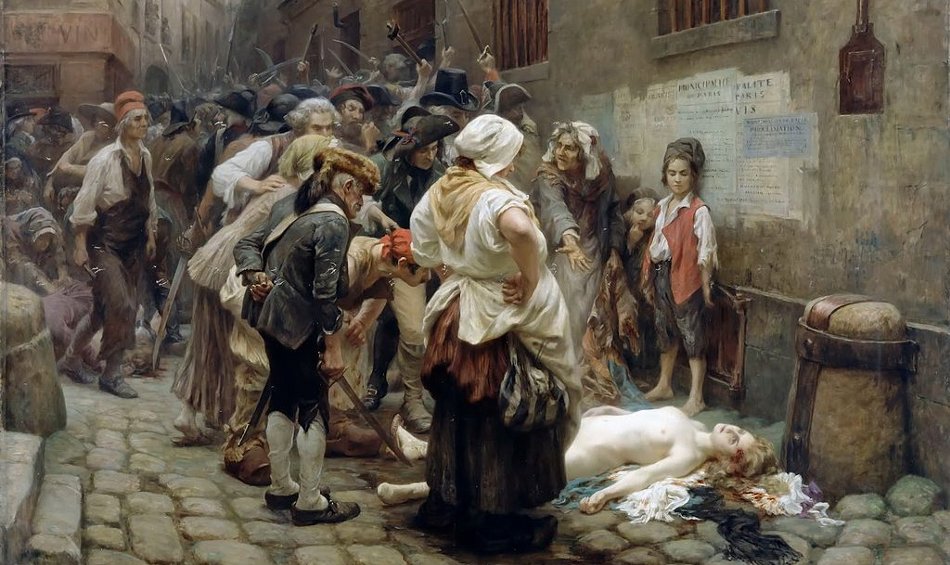

 |
| 11/28/16 | |||||||
Winning the electoral college with 306 votes is a popular vote win
The electoral college cools the passions of current popular will by spreading popular power over time. History has shown us why this is a better system. FRENCH REVOLUTION- Death of the Princess De Lamballe, by Leon Maxime Favre |
|||||||
Trump won a big popular vote victory as measured by House seats To win 306 electoral votes, a candidate must win jurisdictions that govern a majority of the population of the United States. Electoral votes are allocated in part based on population and Trump won a majority of those electoral votes. Trump did not win because of electoral votes that are allocated in proportion to Senate seats which are not popularly allocated. He won a majority of electors based on allocation by House seats, which is a popular vote win. If we subtract the electoral votes allocated by Senate seats, Trump won 246 electoral votes to Clnton's 192 electoral votes. This includes only electoral votes allocated by popular vote. The sustained popular will, not the latest popular vote, governs presidential elections in America Our founders designed a complicated system of government that spreads out power as much as possible. Not only is power spread throughout different branches of government, but power is spread over time as well. Popular will is not determined in a single election in our system. The elected branches of government are elected on a staggered schedule so that no one wave of populist will in one election can sweep a party into power. Rather, the popular will is expressed every two years in the House, every four years for the president and every six years for the Senate. To truly take dominant power a party must perform well in several successive elections. But even then we have a federal judiciary that is appointed for life. So to gain dominance over the judiciary a party may have to perform well in as many as five or six federal elections over a period of ten to twelve years. The senate is only elected every six years and the president every four, so to really dominate in the judicial selection process a party needs to dominate for quite a long time. Does that mean that the federal judiciary is not an expression of popular will? Not really, it's just an expression of popular will in the past, a popular will sustained over time. In the same way, the presidential election we hold every four years is really the result of the expression of both current and past popular will extending as far back as eight years. The census takes place every ten years. The census determines how many congressional representatives each state has, which in turn determines how many electoral votes a state has. You might ask, but isn't the census just a straightforward headcount? How could that be political?
The census is very political. The political part comes in when the Census Bureau attempts to count people who have traditionally been hard to count, usually racial and ethnic minorities, poor people and immigrants, both legal and illegal. Yes, illegal immigrants count for the census. The primary controversy with regard to the census centers around statistical sampling. The Census Bureau did not use it in 2010 but it has been used in the past. Essentially methods would be used to estimate how many people are not being counted, including racial and ethnic minorities, the poor and legal and illegal immigrants. This approach would likely give more congressional seats to California, Texas, New York, Florida and Illinois, and other states where illegal immigrants tend to gravitate. As you can see, it has the potential to influence the presidential election for this reason.
Beyond the census, the presidential election is also an expression of the popular will as expressed in state elections for as many as eight years prior to the actual election. State legislatures and other organs of state government actually draw the new congressional district lines once the Census is completed. How these lines are drawn can influence which party is more likely to win each district. Who controls congress can potentially influence who wins the presidency in the case that no candidate reaches 270 electoral votes. The party that controls congress also controls funding for the Census Bureau, so that probably has an impact on how the Census is conducted.
|
So you can see that each presidential election is kind of like the ultimate expression of a series of recent elections, begining every ten years when the Census is taken. One reason this presidential election was signficant is that the 45th president, Donald Trump, will be in power when the 2020 Census is taken.
Eliminating the electoral college would favor non-diligent voters The presidential election involves the least amount of effort to learn about and engage in on the part of the voter. There are only a few candidates and everyone in popular culture comes out for this election one way or the other. Every potential voter, as a result, knows about this election and seems to have an opinion on it. The presidential election will force itself upon the most disinterested person, often causing him or her to form opinions that he or she would never form on a less covered and consequential race. Celebrities campaign against Trump and target Democrat voters
The Democrats in particular have the ability to mobilize their voters in the urban areas much more so in presidential years because of this in-your-face quality of presidential elections. Turnout for presidential elections is much higher than non-presidential year congressional elections. So the Democrats, as a result, would love it if the popular will as expressed in presidential years alone influenced who actually becomes president. But presidential year popular vote is just one half of the popular vote equation in our system. Half of all federal elections for congress take place in non-presidenital years and vice versa. Because non-presidential year federal elections do not generate as much popular interest from celebrities and in other ways, the electorate in non-presidential years looks very different than presidential year electorates. People who are more diligent about voting, who are also much more likely to be informed, show up to vote in these non-presidential years. As demonstrated in the previous section, non-presidential year elections influence who wins the presidency. This fact has a calming and cooling influence over our presidential elections. Rather than leaving the selection of our chief executive up to an excited populace raging in a presidential year, we spread out the power not only to electors within states but to the popular will as expressed in previous non-presidential elections when the diligent voter dominates. It puts more power in the hands of those who dedicate themselves to voting each and every election, people who are generally more informed. This is a very good thing for stability and the rule of law. The House of Representatives defends current popular willWe must remember also that the popular vote already does dominate our system of government even when a president who does not win the most recent popular vote is elected. We do not have a king but the people are sovereign. The House of Representatives is the most direct expression of that popular sovereign will and the House alone has power to initiate all revenue bills, impeach federal officials, including a president, and elect the president if no candidate reaches 270 electoral votes. The House can always check the president. The left's extraordinary hypocrisyMost of what the left considers social progress in our nation has resulted not from popular will, but by imposition of a minority view by an unelected and virtually unaccountable panel of nine judges in the form of the Supreme Court. The integration of schools, the creation of a privacy right that supports abortion and same-sex marriage all came from the least democratic branch of our government. Short of full-scale revolution, the electoral college is here to stayAll of the complaining about the electoral college rings hollow. The only way to change the electoral college is through a constitutional amendment and that's not going to happen when it benefits the majority of states. The founders baked this into the constitution in such a way that it's not going to change. So anyone arguing for it seems to be arguing for revolution, because that's the only way the electoral college will ever go away. |
||||||
